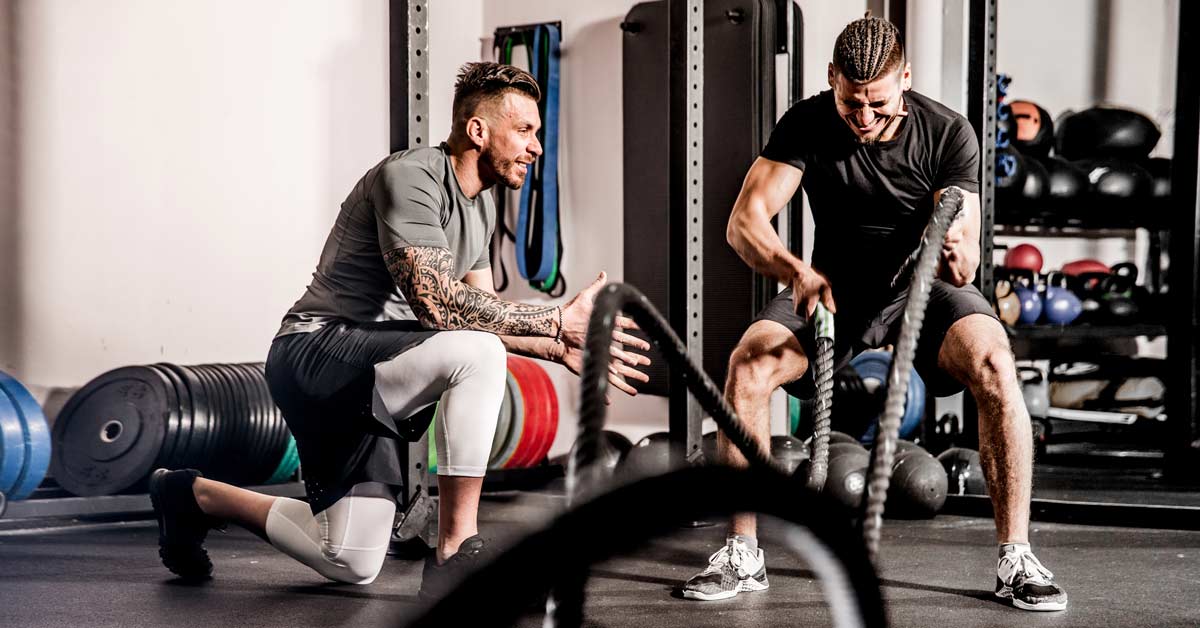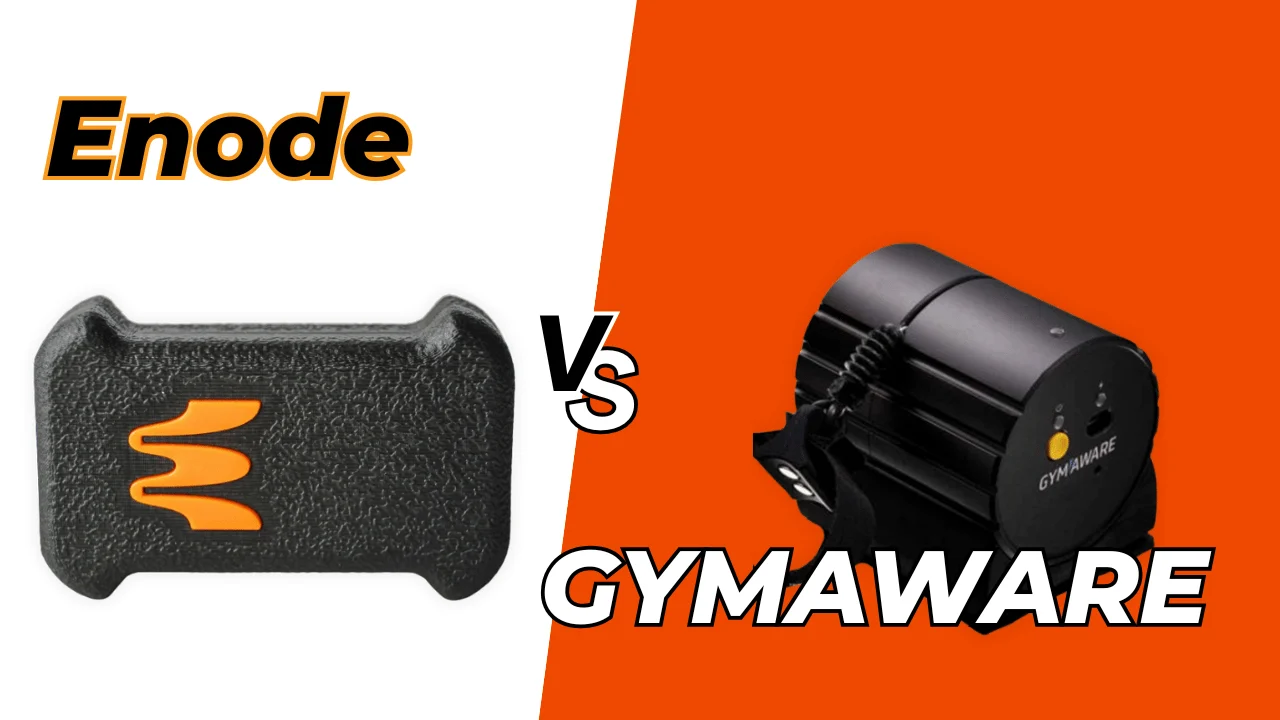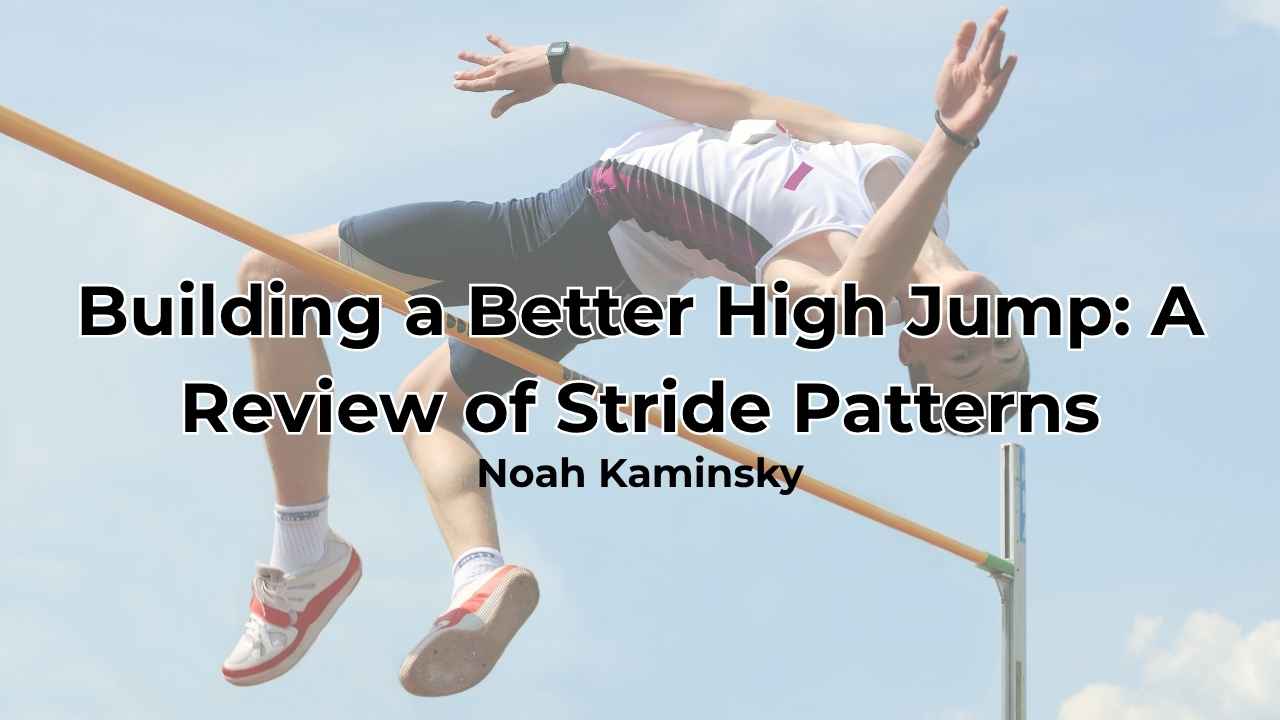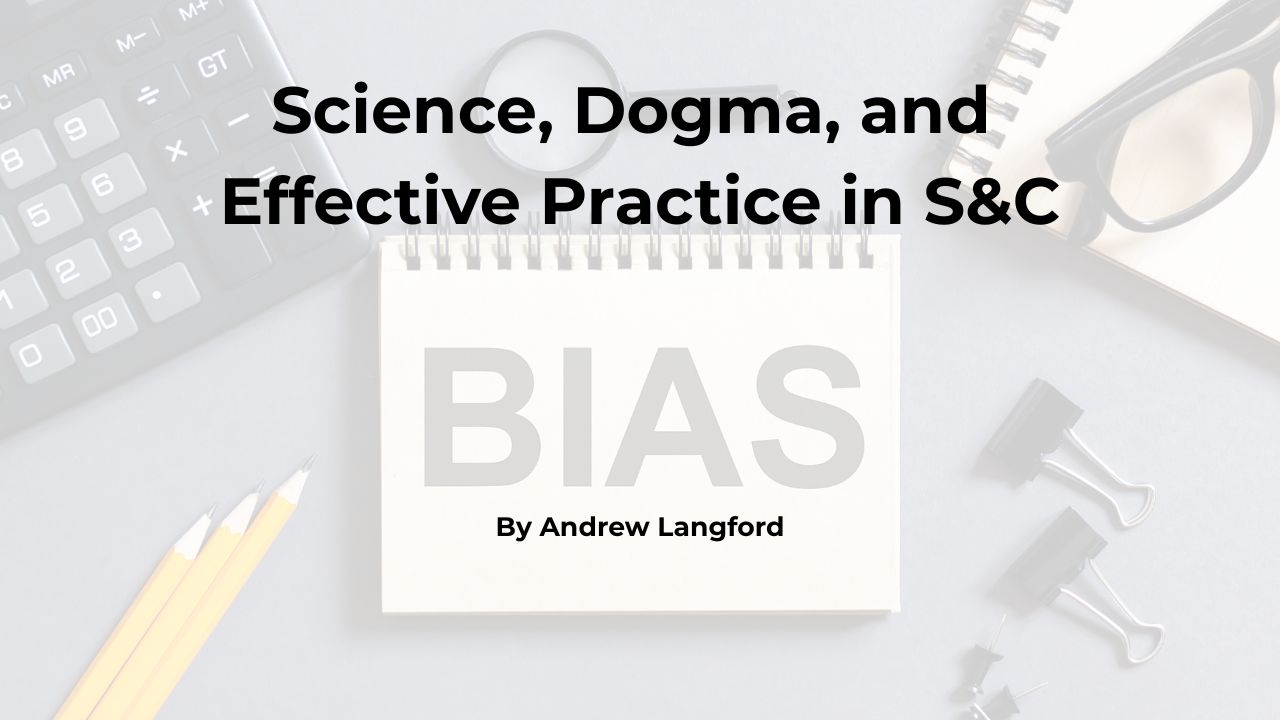[mashshare]
Social media has been both a curse and a great tool for the sports performance community. As anyone who is in my network of “contacts” knows, I spend a great deal of time both reading and posting. While it can be time-consuming, it has led to a lot of positive things in my life. I’ve been able to network and grow as a coach.
I’ve also spent my fair share of time involved in Twitter “battles” and debating many topics at length. That sounds like a negative. Sometimes it can be, but other times it is a learning experience. In fact, I’m pretty sure SimpliFaster first asked me for an interview because of an approximately 200-tweet debate I had with a few friends on “chasing numbers.” (We all chase them—it’s the process we use to pursue numbers that can be flawed, not the actual pursuit.)
However, even a person who loves to debate on social media can’t always take on every agitating topic that pops up. Luckily for me, I’m blessed to have a forum outside of traditional social media in which to share my thoughts. The problem is not everything that irks me has enough “meat” to fill an entire article. So instead, I decided to brainstorm a few big issues and attack them with smaller rants, rapid-fire style. Not all are actually things I saw on Twitter. Some are just observations I’ve made over the years.
My real goal here is to start a discussion and thought process that advances and protects the S&C profession, says @YorkStrength17. Share on XMy disclaimer here is that these are the issues that personally offend me. You may agree with all, disagree with all, or land someplace in the middle. My real goal here is to start a discussion and thought process that advances and protects the profession. As Socrates said, “I cannot teach anybody anything, I can only make them think.” So here is my (not even close to complete, but I only have so much space) “list” of issues I commonly see on social media and other outlets that I believe hold back our field.
The ‘Demo’ Man
I saw somebody post, “A demo is worth 1,000 words.” Amen! I agree with you totally. I just don’t agree that a coach can’t be effective if they can’t currently demonstrate the movement. Yet there is a post about once a week saying, “If you can’t demonstrate the movement, you can’t teach it,” or something similar. That’s simply not true.
This is an irresponsible statement to make as well. Why are we putting out into the world a claim that severely limits a strength and conditioning professional? Saying things like,“If you can’t demonstrate a movement, you can’t be effective,” basically tells the world that any strength coach with any type of physical limitation is not capable of being successful. How is that helpful in bringing legitimacy to our role in the high school setting? It’s not and it sets a bad precedent.
Not to mention, it’s offensive to the many coaches who do an outstanding job despite physical limitations. What we don’t need in our field are extremists. This is a perfect example of short-sighted, extremist thinking. I’m guessing most of the people making a blanket statement along these lines are also in their 20s or early 30s. Because this old beat-up man is in his very late 40s and subscribes heavily to the “just because you can, doesn’t mean you should” school of thought.
That being said, I do agree that there should have been a time in your life when you did have mastery of the movements you teach. That’s not to say there are no exceptions, but having knowledge of, and experience with, the intricacies of the movements you teach is imperative. I also agree wholeheartedly that there needs to be a demo when teaching movements. I just do not believe that it’s the coach who has to do the demonstration.
I agree wholeheartedly that there needs to be a demonstration when teaching movements. I just don’t believe it’s the coach who has to do it, says @YorkStrength17. Share on XPersonally, I still have the physical ability to demonstrate any weight room movement I teach. I still demonstrate most movements that I am physically capable of doing at the moment, and I will continue to do so as long as I’m able. The ability and the body don’t always agree on when those demonstrations can take place. I can still absolutely do a full snatch from the floor—as long as I get about 20 minutes to warm up before I do a set. I don’t always have that time.
So, should I just not teach a snatch even if I feel it’s appropriate for the situation? No, I need to be a teacher. I need to be able to articulate and teach an athlete to demo for me. Why is it bad to show a video of a correct movement, then verbalize your teaching and use a more experienced athlete as the demonstrator? The fact is that the time when we can no longer do everything we need our athletes to do WILL come. When it does, will that mean we are done coaching? That is just a naive way of thinking.
What do you think takes more skill or shows the type of teacher and coach you are: snatching or being able to teach and cue the technique so that an athlete or younger coach can demonstrate? When doing speed work, I can still show the basics, but when we get to full demo, I pick out an accomplished athlete with a level of mastery and use my teaching ability to demo it.
There is little doubt that my athletes will gain more from watching an athlete in their prime doing a bounding drill than a man in his late 40s. (Plus, a torn Achilles is one explosive movement away—just ask Coach Gary Schofield!) Simply stated, from my 23 years in the field, I can tell you I’m more concerned with being a master teacher than a master lifter.
What will build confidence in our field is sports performance professionals moving past the “meathead” persona and being seen as high-performance masters of our craft, says @YorkStrength17. Share on XThe image of the “meathead” coach grunting and snorting while they lift won’t build confidence in our field as we move forward. What will build confidence is sports performance professionals moving past that persona and being seen as high-performance masters of our craft. For the sake of all strength coaches, let’s get past this “demo coach” thought process and instead assume the role of master craftsman with our intellect being more important than our physical capabilities.
You Must Look the Part
Here is another opinion that makes ZERO sense to me. As with the “demo” situation, it hurts all strength coaches by making generalizations with no basis seem factual. Maybe if you are a personal trainer in a highly competitive setting it would help get you clients. It won’t make you a better PT, but it may help you initially. In strength and conditioning at the high school level? Who cares? You know how many big, muscular people know absolutely nothing about sports performance? Just go to any local gym and point out a muscle head, and chances are they are one.
Now, again, I personally still “look the part” and although I’m looking more and more like an old powerlifter than a bodybuilder these days, I am still a big guy who lifts heavy stuff. That has nothing to do with what type of strength coach I am. Absolutely nothing at all. If I stopped training tomorrow and just downed pizza and ice cream all day, I wouldn’t look like a strength coach. But I’d still be the same coach (and only eating pizza and ice cream maybe three times a week).
Your day one physique may get the athletes to look at you and say, “Man, that guy is big, he must know his stuff.” But then you have to open your mouth and coach. Your intellectual ability and ability to master your craft are unrelated to your physical appearance. You have to show your knowledge and how much you care. Looking like Magnus Magnussen will gain an initial “wow” factor, but it won’t get the athletes to trust or believe in you.
Your intellectual ability and ability to master your craft are unrelated to your physical appearance. You have to show your knowledge and how much you care, says @YorkStrength17. Share on XI hate to keep beating a dead horse, but this is another young coach’s mistake. I used to believe the same thing. Then I worked in the field for years. It didn’t take me long to realize the most important part in a sports performance professional’s body is the brain.
A shaved head and a beard will never, ever replace an educated and capable brain or make a coach a master teacher. The solution is simple. Judge your colleagues based on merit, knowledge, and ability. For the same reasons I stated above, we need to project information that brings legitimacy to our profession, not opinions that could keep a great coach from getting a job.
Training While Coaching Athletes
Another thing I see and hear about occasionally is coaches who actually train with the athletes. Who knows, maybe I’m off base here, but I don’t see how this is a best practice. How can you focus on your personal workout while supervising and coaching a group of athletes? This goes directly back to raising the professional legitimacy of our field above its current level.
How can we possibly be seen as professionals when we act like the athletes? Am I being a grumpy old man here or do you see my point? Seriously, when I’m on the floor with my athletes, I am on the move and coaching on the run from whistle to whistle. I usually feel like I’ve worked out by the end of the day, but coaching is my purpose for being there. Not just from a practical professionalism standpoint, but also from a liability one, it’s not good practice.
What happens if one of the athletes does something they shouldn’t, and someone gets hurt, and you missed it because you were doing a set of bench presses? I’m no judge or jury, but I’m guessing the second that tidbit comes out, the case is over and you lose. It’s our job to COACH. We need to be viewed as operating at the same level as athletic trainers and other sports medicine personnel. I’ve never once seen an AT participating in a workout or practice. Why? Because they are professionals and they have a very important job to do.
Strength and conditioning coaches need to be viewed as operating at the same level as athletic trainers and other sports medicine personnel, says @YorkStrength17. Share on XHow are we any different? I don’t claim to be the best coach alive, but I can promise you I’m invested and aware of the room from start to finish. You can’t do that and work out at the same time. Motivate the kids, hug them, coach them, jump around if that’s your thing, but never remove yourself from the role of coach by knocking out a workout with your athletes. You owe the athletes your best.
If you walked into your child’s math class and the teacher was at a desk doing the same worksheet as the kids and not teaching anything, you would be unhappy about the level of education going on. Don’t be that coach. It’s not fair to your athletes. It’s also not fair to your colleagues who strive to be seen as high-performance professionals in the field.
Whiteboard Workout While You Sit in Your Office
This is something that happens way too often and literally defines the word “incompetent” for me. The coach who writes up a workout on the whiteboard and then goes with other coaches and talks about anything other than the current session. This is the very definition of poor, lazy coaching in the weight room, and another example of a complete lack of professionalism in our field. There is no way to defend or excuse it.
How is this a thing? Even if you don’t coach, you must at least supervise. And that is pretty low on the coaching effort scale. I don’t really feel the need to get into a whole lot of detail on this one. Don’t, under any circumstances, do this. If you are so uninspired overseeing a team in a strength and conditioning setting, hire someone who IS inspired.
I have said this in a few places in this article already, but it is unfair to your athletes and to the profession. They may not even realize it, but you are being neglectful in your duties. Maybe someone out there will take offense with this opinion and disagree. If so, please feel free to reach out and explain to me how this behavior is anything but wrong. Coach your kids, keep your kids safe, teach them the way to do things, and help them improve. Raise the level of excellence in the field of strength and conditioning.
No Differentiation of Training
There are far too many situations in the high school setting where freshmen and seniors do the exact same workout with no variation based on training age. This is a real problem and it shows a lack of professional standards. It’s also a big reason that so many sports coaches, athletes, and parents have a skewed view of the importance of strength and conditioning.
Part of being a professional in any field is seeking out the best, most effective, and safest practices and mastering them. When you refuse to do that, you hurt us all, says @YorkStrength17. Share on XPart of being a professional in any field is seeking out the best, most effective, and safest practices and mastering them. When you refuse to do those things, you hurt all of us. It’s that simple. It shows a lack of depth of knowledge and leads to injured and frustrated athletes. That results in a lowered perception of all strength programs by those athletes and their parents. That, in turn, spreads to others and can affect how they view us as a profession.
I understand that, in some situations, the coaches just don’t know any other way, just as I didn’t. On the one hand, I give those coaches a little bit of a pass and think, “They don’t know what they don’t know.” On the other hand, is ignorance of the law an excuse for breaking it? In my experience, it isn’t.
It’s up to the coach to seek out knowledge and best practices. It goes back to the question: “How many years have you coached? Many years or one year many times?”
This topic could be an article in itself if we get into the specifics of a “blocking” program. I’ve outlined the early stages of my program in other articles. For this, we will just stick to the really big picture. Regardless of how you do it, you need to have an evidence-based progression and regression system in every program. If you don’t, you’re asking for trouble.
“Do no harm” has to be our top goal. We build from that point. The athlete’s health and safety must be the priority, not rushing them into movements they are not prepared to do safely. If you have not learned the term “Block 0,” you need to. It’s time for all coaches who oversee athletes in a sports performance setting to dedicate themselves to a long-term athletic development program. While it may not seem to provide the immediate results from a lift total standpoint, it will ensure the well-being of your athletes. In the long run, they and your program will see better results.
You don’t put a student in college-level Calculus if they haven’t taken Algebra I first. That seems ludicrous to even consider, as it would ensure their failure. Why is our strength program any different?
The Research Says
This may be an unpopular opinion with some, but just because there is or isn’t supporting research for something we do, doesn’t mean it works or doesn’t work for what we intended it to do. Please don’t get me wrong—I believe in research. What I don’t believe in is the “sports science bullying” that seems to be gaining more prominence in our field.
In the book “The System,” the authors discuss the differences between American sports performance programs and those of the former Eastern Bloc. They mention that in the Soviet system, sports scientists and sports performance coaches worked together in a very symbiotic way, while in the American model there is often a disconnect. I see this playing out in our field, and it has a negative effect on all of us.
Too many sports science people don’t spend a minute coaching and it shows. We also have way, way too many coaches who pay no attention to the science side of the profession and guess at everything they do. Both of these groups hurt our profession. By acting against each other, it gives an illusion of incompetence. That is a bad thing for those of us who value both sides.
The crazy thing is that we have many, many coaches who excel as both sports scientists and coaches. Those coaches actually bring great value and legitimacy to the field.
My program motto, for example, includes the fact that everything we do will be “evidence-based.” I don’t believe in doing anything without knowing why and being able to defend that why with an evidence-based argument. I’m not a sports scientist, but I do believe in the value of research and the role of sports science in preparing athletes. The problem I have is when people want to argue about something that is common sense for most coaches and say, “Well, there is no research to back that up.”
Over the last month or so, I’ve seen multiple debates about some of the protocols used in a Block 0 program to prepare athletes for higher complexity movements. The one that really got me was, “Do we really need to teach kids to jump and land correctly? They jump and land in play, so they should naturally learn to absorb force efficiently.” Seriously?
I have no idea if there is research that proves or disproves the fact that young athletes need to be taught proper jumping and (especially) proper landing techniques. I never looked it up because I don’t care what it says. I work with young athletes and I watch how they jump and land when they come to me. I watch how they improve as we “slow cook” those techniques through a progression. That’s “evidence” enough for me.
Joe Kenn said in a post, “Jumping as play and repeated explosive jumping are not the same.” He nailed it in that sentence. Sure, playing will develop skills, but not everyone will use efficient technique when they play. I can’t imagine any coach who works with young athletes on a regular basis believing that it isn’t necessary to teach kids the proper and efficient way to land and absorb force prior to repeated explosive jumping. My point here is that sometimes it doesn’t matter whether there is or isn’t research on a topic.
There are aspects of sports performance that are driven by common sense. Don’t overthink everything. Research is an important aspect of sports performance, but sometimes research and evidence are not the same thing. Sometimes the “eye of the coach” is what matters most. After all, eyewitness testimony is considered evidence in a court of law.
Sometimes we use our coach’s eye to judge things a success in our particular situation. That’s not wrong, regardless of what an organization writes in a book and declares right or wrong. Never underestimate the human element in any field of study when it comes to practical application. I’m not advocating guessing; I’m advocating repeating what you, as a coach, have seen produce results without relying solely on “what the research says.”
Embrace sports science, but also embrace being well-rounded and mastering the coach’s eye, says @YorkStrength17. Share on XEmbrace science, but also embrace being well-rounded and mastering the coach’s eye. Push back against the “science bully” and the coaches who ignore evidence-based programming. Once again, strive to raise the public perception of a sport performance professional and be a person who helps push our field forward.
Let’s Educate One Another
I probably sound like a grumpy old man in this article. To some extent, I probably am. My intent, however, was not to be that, but instead stimulate thought and help advance our growing field. We need to be seen as multidimensional and well-rounded to be recognized as professionals on par with our colleagues in the area of sports medicine. I believe this is a realistic goal.
How can we move forward as a profession and eliminate things we see as hindrances to success for all athletes who step into a program? What can we, as sports performance coaches, do to help educate coaches who may not quite be reaching what we would consider best practice? It starts with us. I plan to continue to speak, write, and practice the things I believe in, in the hope of helping educate coaches who may not know how to reach their goals.
Nobody wants to do the wrong thing for a student-athlete. I encourage you to use this list or make your own list of things that you see happening that you feel are not the best. Then, strive to educate those around you who may not know they are doing anything wrong. To raise our professional legitimacy (which, in turn, will raise salaries, opportunities, etc.), we must add value to our field. WE do that by getting rid of the “demo coach” attitudes and the sports science “bully.”
We are all in this together. Let’s make it a priority to work together to raise the standard and overall level of coaching at the high school level. The bottom line is that a rising tide raises all ships. Raise the tide for somebody who needs you. We all benefit in the long run.
Since you’re here…
…we have a small favor to ask. More people are reading SimpliFaster than ever, and each week we bring you compelling content from coaches, sport scientists, and physiotherapists who are devoted to building better athletes. Please take a moment to share the articles on social media, engage the authors with questions and comments below, and link to articles when appropriate if you have a blog or participate on forums of related topics. — SF
[mashshare]




